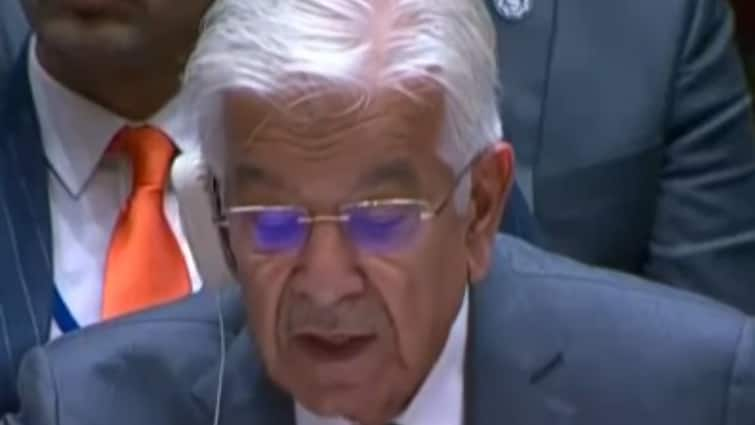Pakistan’s Defence Minister Khawaja Asif found himself in an uncomfortable spotlight at the United Nations Security Council (UNSC) while speaking during the AI Innovation Dialogue chaired by UN Secretary-General Antonio Guterres. Instead of his message on the dangers of artificial intelligence in warfare, the internet is abuzz with a viral compilation of his speech gaffes, at least seven of them, including stumbles over simple and technical terms alike.
“Sirst”, “Riks”, “Pip-Pillars”: Viral Clip Draws Laughter and Criticism
In his speech, Asif mispronounced basic words such as “risk” (as “riks”) and “development” (as “developend”), struggled with the word “first” (saying “sirst”), and flubbed “six pillars” as “six pip-pillars.” At one point, he referred to the “breathtaking space” before quickly correcting it to “breathtaking pace.” His delivery faltered again on more complex phrases like “technological disparities” and “instability.”
Social media users reacted sharply. A compilation video shared by news agency ANI garnered widespread attention. One Instagram user joked, “Operation Sindoor shook him,” while another quipped, “He can’t even speak one sentence properly.” A third asked, “Arre kehna kya chahte ho?” (What are you trying to say?), echoing the confusion many felt. Another comment read: “When speeches are made using AI, people like this would have no knowledge of what they are even stating, forget about its meaning or facts.”
Despite Stumbles, Key Points on AI Warfare Raised
Amid the blunders, Asif did attempt to convey serious concerns about AI in modern conflict. He warned that artificial intelligence “lowers the threshold of conflict, compresses decision-making timelines, and narrows diplomatic options.” Stressing the absence of regulatory frameworks, he added, “In the absence of global normative standards and legal guardrails, the AI revolution risks reinforcing digital divides, entrenching new forms of dependency, and imperiling peace.”
He also referenced Indo-Pak tensions, pointing to Operation Sindoor, an Indian military action in May launched after a terrorist attack in Pahalgam that claimed 26 lives. Asif cautioned about the deployment of AI-driven military assets such as autonomous loitering munitions, high-speed dual-capable missiles, and drones during the conflict.
While his points touched on real risks posed by emerging military technologies, many observers criticized the lack of coherence and clarity in delivery.
Meanwhile, UN Secretary-General Guterres reiterated calls for reforms in the Security Council, arguing it should reflect contemporary global dynamics rather than the geopolitical structure of 1945. He notably mentioned India as a key voice that should be represented in a reformed UNSC.



